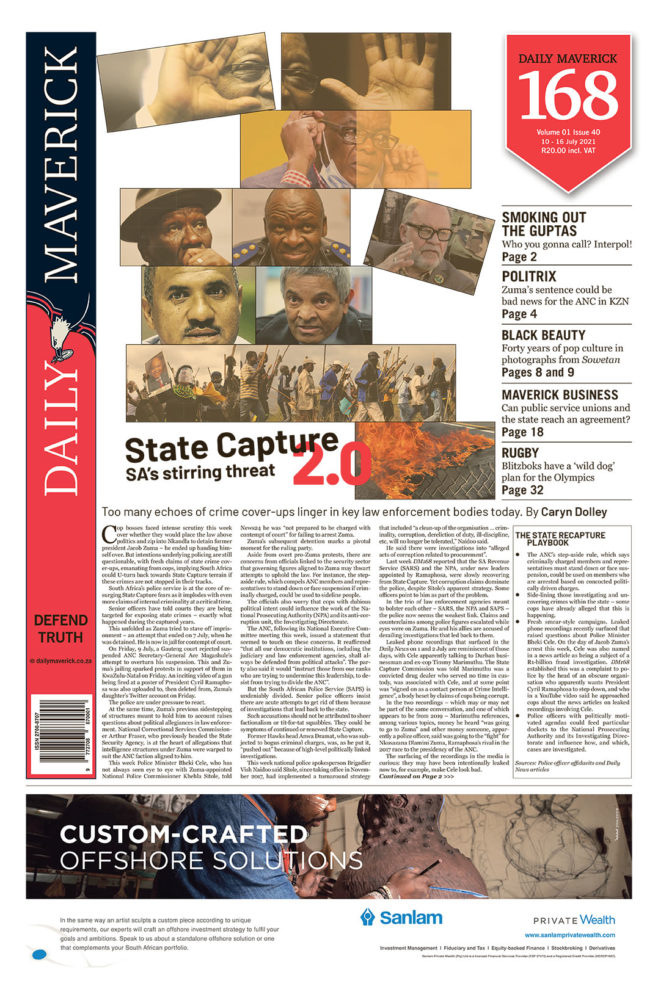First published in the Daily Maverick 168 weekly newspaper.
Protests had started in May following the unexplained death of Thabani Nkomonye, a final-year law student, but it was the emergence of several videos showing police using violence and teargas to disperse protesters that rattled the government. Although permission has been given for the network to be switched back on, the 10-day block achieved its purpose – individuals’ ability to receive and share information was severely restricted, with the result that few people outside Eswatini know what is happening, and – more importantly – what happened in those days of darkness. In all cases, MTN was the main service provider forced to implement the instruction. And, in all cases, it was damned if you do, and damned if you don’t. (In fact, in some countries it’s probably a case of damned if you do, dead if you don’t.)
Internet shutdowns are an increasingly popular instrument among dictators and autocrats who want to control their citizens and pre-empt political threats. Research by Steven Feldstein, a non-resident fellow of the Carnegie Endowment for Global Peace, indicates that internet shutdowns are one item in a broader toolkit of digital repression that includes digital surveillance, online censorship, cyberattacks, hacking, disinformation, and targeted arrests and detentions of internet users. As more citizens exclusively rely on the internet to communicate and conduct business, autocratic governments are increasing their efforts to monitor and control cyberspace.
The question is: What to do about this, particularly when you are the licenced operator receiving the instruction? And when the entity issuing the instruction holds the key to the licence? MTN has been criticised for its actions by civil society, which accuses the telecommunications player of supporting those governments intent on interfering with the exercise of human rights, including freedom of expression, association and assembly. Not to mention the fact that shutting down the internet disrupts businesses and, in countries like Uganda, access to financial services and money transfers.
Businesses rightly have a responsibility not only to respect but also to defend human rights and to mitigate or remedy harms they cause or contribute to. Under the United Nations Guiding Principles on business and human rights, businesses “should avoid infringing on the human rights of others and should address adverse human rights impacts with which they are involved”. One could argue that by shutting down the internet, MTN has been acting contrary to those principles. That said, I have a measure of sympathy for it, particularly the MTN of former CEO Rob Shuter and current CEO Ralph Mupita.
The pair have worked hard to set the firm on a new course. The company of old was a swashbuckling, pioneering, conquer-at-all-costs type of company. It grew fast and many people became extremely wealthy through it. But the governance and controls were lacking and problems were inevitable. The company’s licence battles with the Nigerian government are legendary, but other allegations are more concerning – and damaging to its reputation. It has been accused of paying protection money to terrorist groups in Afghanistan and of paying bribes to win its licence to operate in Iran. The company denies all of the allegations, but sometimes, you know, mud sticks.
Under the current leadership, I do believe that things are changing, and it’s not just the business strategy that has been refreshed, but the culture too. Mupita’s Ambition 2025 strategy, unveiled earlier this year, puts environmental, social and governance principles at the centre of group decision-making. But doesn’t this mean that the company should exit markets that clamp down on democracy? I don’t believe that solves any problems; it simply leaves populations exposed to the next, possibly more compliant operator.
Instead, MTN should continue doing what I suspect it has been doing in Eswatini: boldly contradicting misleading statements issued by the government, rather than issuing platitudes. Last week, MTN corrected the Eswatini government when it tried to suggest that the internet was down because of “infrastructure damage”.
And MTN should work behind the scenes with human rights organisations, the Southern African Development Community, the African Union, other businesses, media, friendly people in government, and anyone else who will listen, to ensure communication services are restored as fast as possible. The people of Eswatini deserve no less.
Clamping down on unrestricted communication is a new threat to democracy and it is not one that can be fought by one company alone. DM168
This story first appeared in our weekly Daily Maverick 168 newspaper which is available for free to Pick n Pay Smart Shoppers at these Pick n Pay stores.



















 Become an Insider
Become an Insider
Comments - Please login in order to comment.